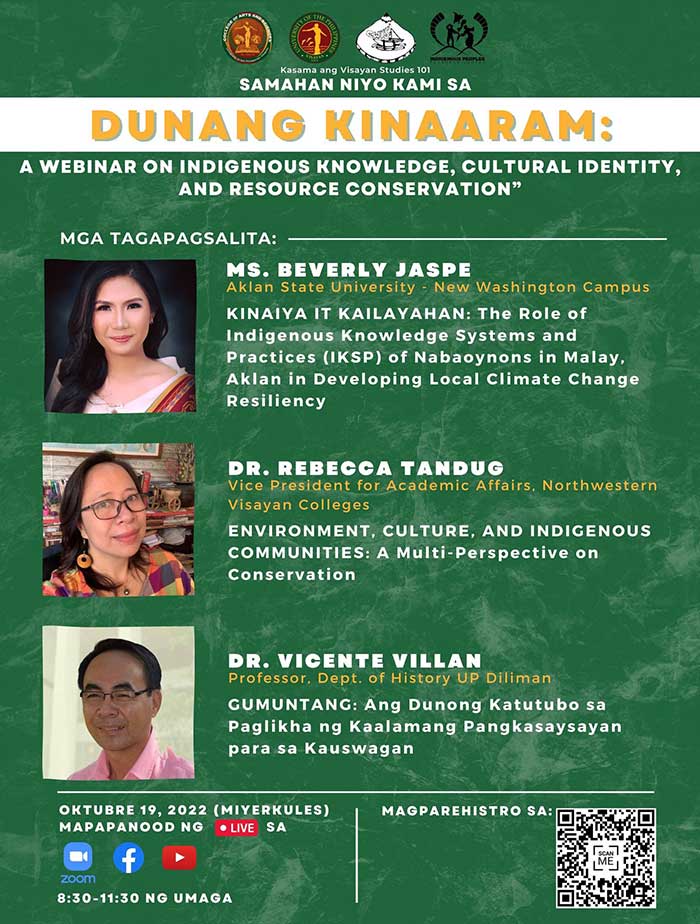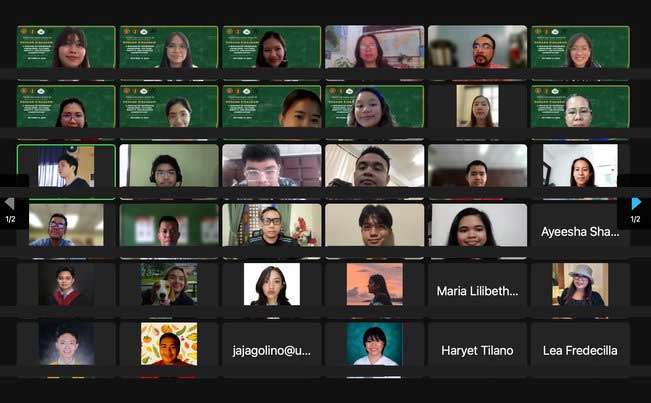The Center for West Visayan Studies (CWVS), the Indigenous People’s Resource Center (IPRC), and the Visayan Studies 101 class held a webinar entitled “Dunang Kinaaram: A Webinar on Indigenous Knowledge, Cultural Identity, and Resource Conservation” last October 19, 2022, from 8:30 to 11:30 in the morning.
The webinar was done via zoom and was streamed live on the UP Visayas official Facebook page. The event was initiated in line with the university’s celebration of National Indigenous Peoples Month.
The program was formally opened with a message from UPV Chancellor Dr. Clement C. Camposano, who emphasized the importance of holding overdue honest conversations that recognize the enduring struggles of IP communities pertaining to their cultural identities and ancestral domains.
This was immediately followed by the first session from resource speaker Beverly Jaspe of Aklan State University titled “Kinaiya it Kailayahan: The Role of Indigenous Knowledge Systems and Practices (IKSP) of Nabaoynons in Malay, Aklan in Developing Local Climate Change Resiliency.”
This session held extensive elaborations on the contributions of Nabaoynons in existing disaster risk reduction and management (DRRM) mechanisms, ranging from their wealth of aquatic resources, myths and superstitions in interacting with the environment in their resource gathering, and their rationalizations of the ongoing disruptions in climate patterns.
The session served as proof that local and indigenous communities, despite being overlooked and excluded in important conversations about climate change solutions, are extremely responsive to environmental changes with their knowledge systems and practices.
The second session, titled “Environment, Culture, and Communities: A Multi-Perspective on Communication,” was given by Dr. Rebecca Tandug Barrios, Vice President for Academic Affairs at Northwestern Visayan Colleges.
Barrios’s session touched on the Northwest Panay Peninsula Natural Park, and its value to the Panay region, focused on existing struggles facing Indigenous Communities and their practices for environmental conservation. Issues that trespass their cultural practices, participation in assessments, and community planning were thoroughly tackled.
Furthermore, the realities of IP communities, our environmental frontliners in carrying much of the burdens of environmental conservation, were discussed, and focus was placed on our authentic goals of creating a community that no longer thinks twice about including Indigenous People in tables where decisions are being made.
The last session, titled “Ang Dunong Katutubo sa Paglikha ng Kaalamang Pangkasaysayan para sa Kauswagan,” was delivered by Dr. Vicente Villan, Professor at UP Diliman’s History Department.
Villan shared his wealth of knowledge regarding indigenous knowledge, value systems, beliefs, and concepts and how they can be employed to further our goals of development and prosperity. The significance of this careful analysis of our very own ideas of living, struggling, and learning all point to further enriching our identities and understanding the society we are living in, employing our own perspectives and meaning-making.
Each talk was followed by a question-and-answer forum, where attendees sent their inquiries and manifestations to be entertained by the speakers. Productive exchanges that tap further into indigenous knowledge systems and practices that equip us in our environmental crisis ensued.
Certificates of Appreciation were presented to the three resource speakers, which was then followed by a photo opportunity session. CWVS Director Prof. Frances Anthea Redison delivered her closing remarks and final message. The program ended with the singing of UP Naming Mahal.
Ciania Belle Gloria and Audrey Eurielle Dayata, Political Science majors and students of Visayan Studies, were the hosts of the event. (Ciania Belle Gloria with Vincent Andrei Trinidad and Larrien Keith Alderete)



















